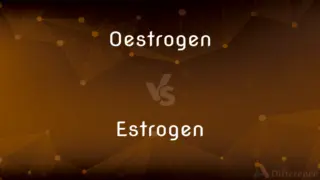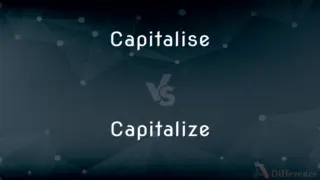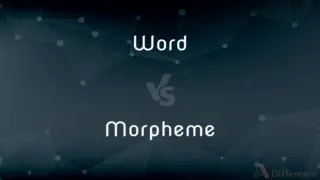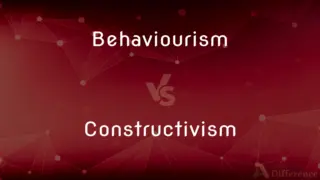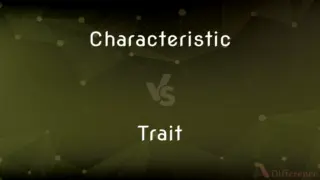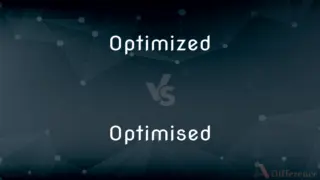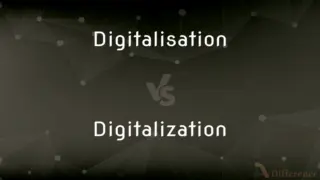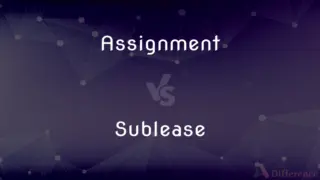Identity vs. Individuality — What's the Difference?
By Maham Liaqat & Fiza Rafique — Updated on March 14, 2024
Identity is the collection of attributes and values that define how one is perceived by oneself and others, while individuality refers to the unique characteristics and traits that distinguish one person from another.
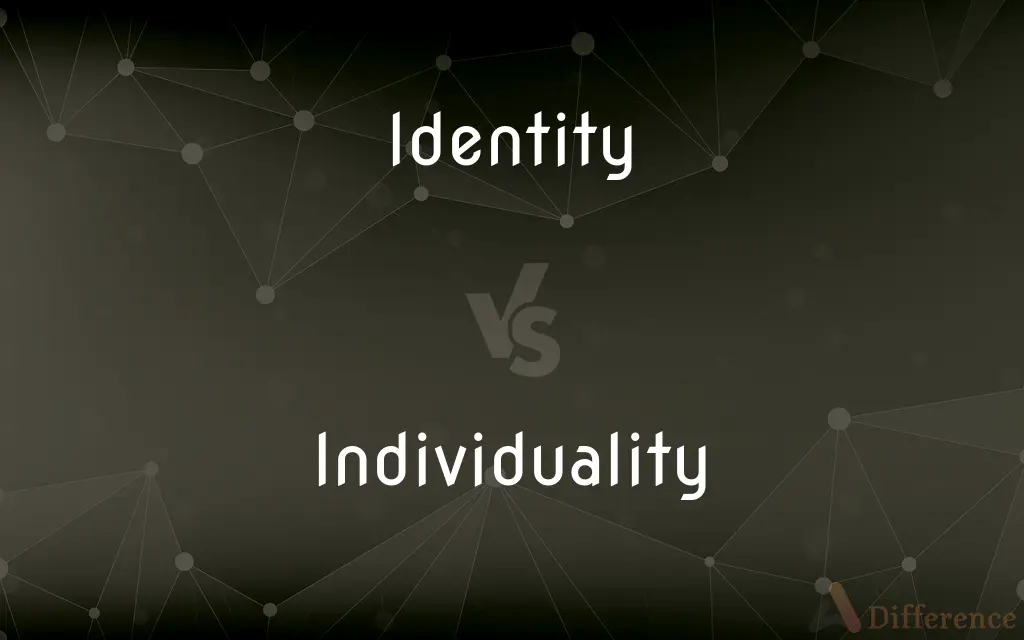
Difference Between Identity and Individuality
Table of Contents
ADVERTISEMENT
Key Differences
Identity encompasses various aspects such as personal beliefs, cultural background, profession, and social roles, contributing to how one is recognized and understood in society. It is shaped by both internal factors like personal experiences and external influences such as societal norms. In contrast, individuality is the expression of one's unique qualities, preferences, and talents, highlighting the distinctiveness of each person.
While identity can be seen as a broader concept that includes elements of individuality, it also incorporates the way these personal characteristics align with or diverge from group identities and societal expectations. Individuality, on the other hand, focuses more on the intrinsic qualities that make a person stand out, regardless of societal categories or roles.
Identity is often associated with the search for belonging and understanding one's place within various groups, be it cultural, professional, or social. This search can involve adopting certain group norms or roles that contribute to a collective identity. Meanwhile, individuality emphasizes the assertion of personal traits and ideas that may not always conform to group norms, celebrating the uniqueness of each person.
The development of identity is an ongoing process influenced by life experiences, social interactions, and personal growth, often involving a degree of introspection and self-evaluation. Individuality, while also evolving, is deeply rooted in one's inherent traits, preferences, and creative expressions, which remain relatively consistent over time.
Although identity and individuality are closely intertwined, with individual traits contributing to one's overall identity, the emphasis of identity is on the relational aspect with others and society, whereas individuality highlights personal uniqueness and self-expression.
ADVERTISEMENT
Comparison Chart
Definition
The collective aspects that define how one is perceived by self and others
The unique qualities and traits that distinguish one person from another
Focus
Belonging, roles, and alignment with groups
Distinctiveness and personal traits
Influenced by
Social norms, culture, experiences
Inherent traits, personal preferences
Role in society
Helps understand one's place and connection to groups
Highlights personal uniqueness and diversity
Expression
Through roles, relationships, and societal positions
Through personal choices, style, and creativity
Compare with Definitions
Identity
A multifaceted concept involving personal and social aspects.
Her identity as a musician and a mother is important to her.
Individuality
Celebrates uniqueness.
The festival was a vibrant display of individuality and self-expression.
Identity
Can change over time.
His identity evolved significantly during his college years.
Individuality
Focuses on personal traits and creativity.
Her individuality shines in her innovative art.
Identity
Shaped by internal and external factors.
His identity was influenced by his cultural background and personal beliefs.
Individuality
The essence of being unique.
His individuality is expressed through his unconventional fashion sense.
Identity
Involves belonging and roles.
Finding her identity within the community was crucial for her sense of belonging.
Individuality
Inherent and consistent.
Despite societal pressure, she maintained her individuality.
Identity
Reflects how one is perceived.
She is recognized by her identity as a committed environmentalist.
Individuality
Distinguishes one person from others.
His unique perspective and humor add to his individuality.
Identity
The fact of being who or what a person or thing is
She believes she is the victim of mistaken identity
He knows the identity of the bombers
Individuality
The aggregate of qualities and characteristics that distinguish one person or thing from others; character
Choices that were intended to express his individuality.
Monotonous towns lacking in individuality.
Identity
A close similarity or affinity
An identity between the company's own interests and those of the local community
Individuality
An individual or distinguishing feature.
Identity
A transformation that leaves an object unchanged.
Individuality
The quality or state of being individual; singularity
She was so involved in the cause that she lost all sense of individuality.
Identity
The equality of two expressions for all values of the quantities expressed by letters, or an equation expressing this, e.g. (x + 1)² = x² + 2x + 1.
Individuality
A single, distinct entity.
Identity
The condition of being a certain person or thing
What is the identity of the author of the manuscript?.
Individuality
(Archaic) Indivisibility.
Identity
The set of characteristics by which a person or thing is definitively recognizable or known
"The identity of the nation had ... been keenly contested in the period of nationalist opposition to Imperial rule" (Judith M. Brown).
Individuality
(uncountable) The characteristics that contribute to the differentiation or distinction of someone or something from a group of otherwise comparable identity.
Identity
The awareness that an individual or group has of being a distinct, persisting entity
"He felt more at home thousands of miles from Britain than he did in an English village four miles from his home ... Was he losing his identity?" (Robert Fallon).
Individuality
(countable) A person.
Identity
The fact or condition of being the same as something else
The identity of the two handwriting samples was established by an expert.
Individuality
The quality or state of being individual or constituting an individual; separate or distinct existence; oneness; unity.
They possess separate individualities.
Identity
The fact or condition of being associated or affiliated with something else
The identity between mass and energy.
Individuality
The character or property appropriate or peculiar to an individual; that quality which distinguishes one person or thing from another; the sum of characteristic traits; distinctive character; as, he is a person of marked individuality.
Identity
Information, such as an identification number, used to establish or prove a person's individuality, as in providing access to a credit account.
Individuality
A habit of thinking and acting in one's own distinctive manner and as one believes appropriate, not being heavily influenced by the opinions of others; - of people.
Identity
An equation that is satisfied by any number that replaces the letter for which the equation is defined.
Individuality
The quality of being individual;
So absorbed by the movement that she lost all sense of individuality
Identity
Identity element.
Individuality
The distinct personality of an individual regarded as a persisting entity;
You can lose your identity when you join the army
Identity
Sameness, identicalness; the quality or fact of (several specified things) being the same.
Identity
The difference or character that marks off an individual or collective from the rest of the same kind, selfhood, sense of who something or someone or oneself is, or the recurring characteristics that enable the recognition of such an individual or group by others or themself.
I've been through so many changes, I have no sense of identity.
This nation has a strong identity.
Identity
A name or persona—a mask or appearance one presents to the world—by which one is known.
This criminal has taken on several identities.
In this show, the competitor's identity will remain secret until after the vote.
Identity
(mathematics) An equation which always holds true regardless of the choice of input variables.
The equation (x+y)(x−y) = x2−y2 is an algebraic identity. It is true regardless of the values of x and y.
Identity
Any function which maps all elements of its domain to themselves.
Identity
(algebra) An element of an algebraic structure which, when applied to another element under an operation in that structure, yields this second element.
Identity
A well-known or famous person.
Identity
The state or quality of being identical, or the same; sameness.
Identity is a relation between our cognitions of a thing, not between things themselves.
Identity
The condition of being the same with something described or asserted, or of possessing a character claimed; as, to establish the identity of stolen goods.
Identity
An identical equation.
Identity
The distinct personality of an individual regarded as a persisting entity;
You can lose your identity when you join the army
Identity
The individual characteristics by which a thing or person is recognized or known;
Geneticists only recently discovered the identity of the gene that causes it
It was too dark to determine his identity
She guessed the identity of his lover
Identity
An operator that leaves unchanged the element on which it operates;
The identity under numerical multiplication is 1
Identity
Exact sameness;
They shared an identity of interests
Common Curiosities
What is identity?
Identity encompasses the attributes and values that define how one perceives oneself and is perceived by others, including personal, cultural, and social dimensions.
How do identity and individuality relate to each other?
While identity includes aspects of individuality, it also encompasses how these personal characteristics relate to and fit within societal roles and groups.
How is identity formed?
Identity formation is an ongoing process influenced by personal experiences, societal norms, culture, and interactions with others.
What is individuality?
Individuality refers to the unique characteristics and traits that distinguish one person from others, emphasizing personal uniqueness.
Is individuality constant?
Individuality is rooted in inherent traits and preferences, which remain relatively stable, though the expression of individuality can evolve.
Why is identity important?
Identity helps individuals understand their place in society, connect with cultural and social groups, and navigate interpersonal relationships.
How do people express their individuality?
People express their individuality through personal choices, creative endeavors, styles, and behaviors that reflect their unique traits and preferences.
Can individuality influence one's identity?
Yes, individual traits and expressions contribute significantly to forming one's identity, adding depth and distinction.
What role does individuality play in society?
Individuality contributes to the diversity and richness of a society, encouraging innovation, creativity, and personal growth.
Can societal norms suppress individuality?
Yes, societal pressures and norms can sometimes suppress individuality, but many people find ways to express their unique traits within or in spite of these constraints.
Share Your Discovery

Previous Comparison
Skinny vs. Emaciated
Next Comparison
Informer vs. InformantAuthor Spotlight
Written by
Maham LiaqatCo-written by
Fiza RafiqueFiza Rafique is a skilled content writer at AskDifference.com, where she meticulously refines and enhances written pieces. Drawing from her vast editorial expertise, Fiza ensures clarity, accuracy, and precision in every article. Passionate about language, she continually seeks to elevate the quality of content for readers worldwide.










